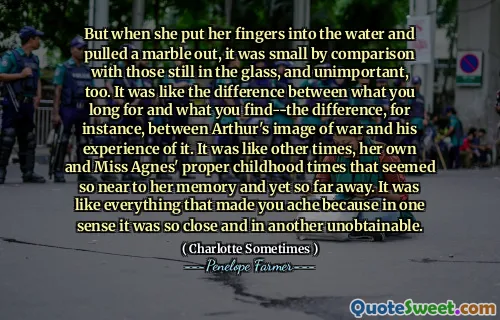
But when she put her fingers into the water and pulled a marble out, it was small by comparison with those still in the glass, and unimportant, too. It was like the difference between what you long for and what you find--the difference, for instance, between Arthur's image of war and his experience of it. It was like other times, her own and Miss Agnes' proper childhood times that seemed so near to her memory and yet so far away. It was like everything that made you ache because in one sense it was so close and in another unobtainable.
This passage from Charlotte Sometimes eloquently captures the bittersweet disparity between expectation and reality. The marble, smaller and seemingly less significant than those still remaining in the glass, symbolizes how our desires or past memories often appear more tantalizing or larger than life when we imagine them. Yet, when faced with reality, they can feel diminished or unsatisfying. The comparison to Arthur's perception versus his actual experience of war lends a poignant weight to this idea, highlighting how anticipation seldom aligns with the harsh truths we encounter. Furthermore, the reflection on childhood moments that feel simultaneously near and distant resonates deeply with anyone who has grappled with the passage of time and the elusiveness of bygone innocence and joy. The ache that comes from this proximity coupled with unattainability is a universal experience — a yearning for what once was or what could have been, always just beyond our grasp. The metaphor invites readers to sit with that discomfort and recognize the complexity of memory and desire, which often contain both sweetness and sorrow. This quote beautifully intertwines the tangible (the marble in the glass) with the intangible feelings of longing and loss, creating a rich emotional landscape that speaks across generations.






